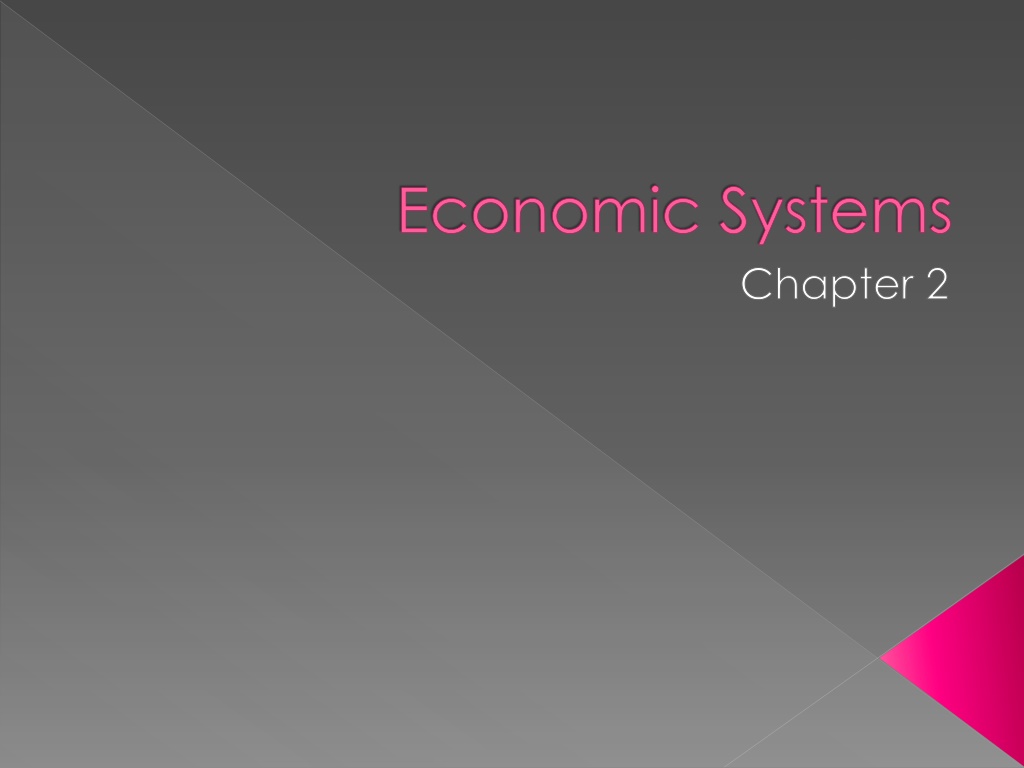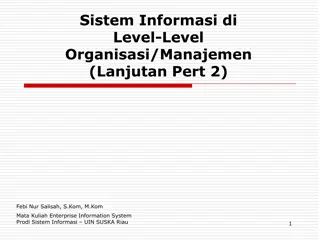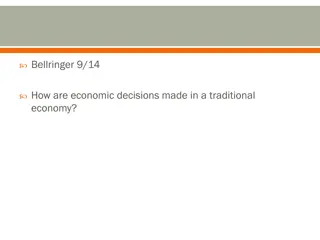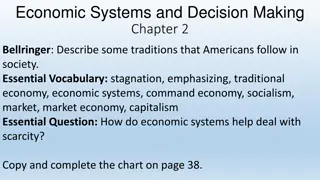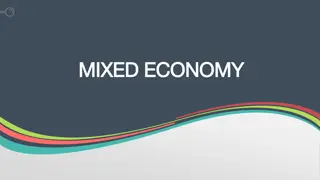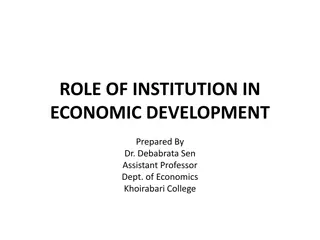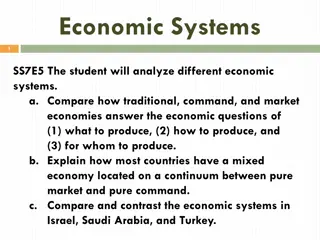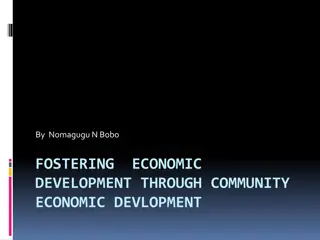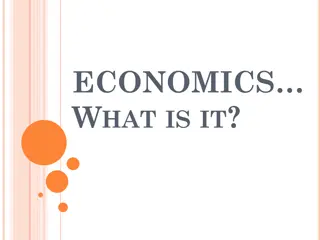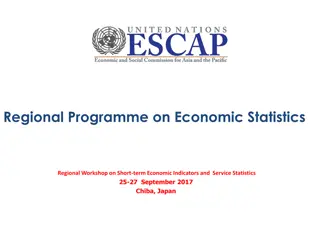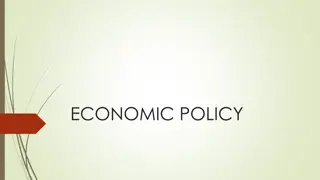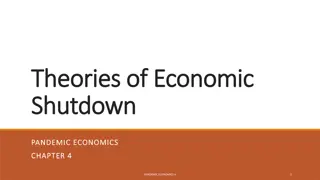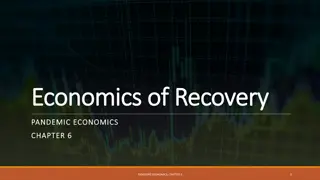Economic Systems: Chapter 2 Overview
All societies have economic systems to provide for the wants and needs of their people. An economic system functions to produce and distribute goods and services to consumers. The key economic questions involve what goods/services to produce, how to produce them, and who will consume them. Society's values of efficiency, freedom, security, equity, and growth influence the answers to these questions. Different types of economies include traditional, market, and centrally planned systems.
Download Presentation

Please find below an Image/Link to download the presentation.
The content on the website is provided AS IS for your information and personal use only. It may not be sold, licensed, or shared on other websites without obtaining consent from the author. Download presentation by click this link. If you encounter any issues during the download, it is possible that the publisher has removed the file from their server.
E N D
Presentation Transcript
Economic Systems Chapter 2
Economic Systems All societies have an economic system or a way of providing for the wants and needs of their people. An Economic Systems function is to produce and distribute goods and services to consumers
Economic System An economy must answer 3 economic questions: What should be produced? How should it be produced? Who will consume these goods and service?
Economic Systems How a society answers these questions depends on how much it values economic goals of efficiency, freedom, security, equity and growth.
3 Key Economic Questions What goods or services should be produced? -How much resources should be devoted to national defense? Education? Health care? 1)
3 Key Economic Questions 2) How should it be produced? -Should we have coal, oil, or nuclear power? Should teacher have 20 kids or 50 kids in a room?
3) Who consumes the goods and services? - How will society distribute income? Who will buy the household products? Who will clean your house? 3 KEY ECONOMIC QUESTIONS
Types of Economies Traditional economy: Relies on habit or custom. Little innovation. Similar to family system. Boys follow dad s footsteps, girls follow mom. Examples: Hunting, farming. Low standard of living.
Types of economies Market economy: Decisions made by individuals based on exchange, trade. (aka free markets, capitalism)
Types of Economies Centrally planned economy: (aka command economy) Government decides everything. Example: communism.
Types of Economies Mixed economy: Market-based economy where government plays a limited role. This is the United States.
Traditional Economy Allocation of scarce resources, and nearly all other economic activity, stems from ritual, habit or custom. Individuals are not free to make own decisions. Advantage: everyone knows the role they play Disadvantage: discourages new ideas
Market Economy People and firms make decisions based on what best suits their interest. Ex. USA, Canada and Great Britain Advantage: overtime it can make changes in demand. Ex. Fast food to health food Disadvantage: does not always provide for basic needs of people. Ex. Homeless people
Command Economy A central authority (government) makes most of the decisions. People have little if any influence over production. Ex. North Korea, Cuba and former Soviet Union. Advantage: can change direction drastically in a short time. Ex. farming to industrial Disadvantage: Not designed to meet the wants of consumers (Everyone gets only 1 In and Out burger.
Chapter 2 Section 2
The Free Market Market: An arrangement that allows buyers and sellers to exchange things. Markets exist because it allows people to buy what they need to consume and sell goods and services they produce.
The Free Market Specialization: The concentration of the productive efforts of individuals and firms on a limited number of activities. Example: a mechanic specialized in fixing Japanese cars or and assembly line
The Free Market Household: A person or group of people living in the same residence. Firm: Business; an organization that uses resources to produce a product Factor market: Market in which firms purchase the factors of production (land, labor, capital) from households
The Free Market Profit: The financial gain made in a transaction Product market: The market in which households purchase the goods and services that firms produce.
The Free Market Free market is an economic system where people do what s best for them for personal gain. Consumers have an interest in looking for lower prices Producers engage in a competition for consumer s money.
Adam Smith (1723-1790) Wrote The Wealth of Nations in 1776 Known as the Father of Economics Said people are selfish, but that s ok because it works Called the relationship between self interest and competition the invisible hand Said government should stay out of the economy (laissez faire means hands off ) Government should only be involved with education, health care and transportation.
Adam Smith Assignment In your notebooks, you will create a graphic organizer on the left side of the Adam Smith article you are about to read
The Free Market Self-interest is the motivating force behind the free-market. People produce goods and services for their own personal gain. Competition is the struggle among producers for the dollars of consumers. This helps control firm s selfishness. Competition act s as a regulating force in the marketplace. Without competition a business can monopolize a product or service
The Invisible Hand (self interest and competition) rewards efficient producers and buyers results in: goods society wants quantity society wants prices society is willing and able to pay normal profits
The Free Market The Free Market Economy, however, does need some Government intervention to provide for things that the market place does not address. Example: national defense, roads and highways, education, and health care Incentive: The hope of reward or the fear of punishment that encourages people to act in a certain way.
The Free Market Why is the free market system good? 1) It works. Producers make what consumers want, when they want it. Prices are pretty good. 2) Freedom. Work where you want, buy what you want, make what you want.
The Free Market 3) Growth is encouraged because innovation is encouraged. 4) A wide variety of things get made because consumers decide what gets made.
The Free Market Consumer sovereignty is the power of consumers to decide what gets produced
Why the Market? Scarcity exists Societies must find a way to allocate scarce goods and services In any allocative mechanism, some people will be told No. The market system is efficient, but Neither markets nor other economic systems are fair.
Chapter 2 Section 3
Centrally Planned Economies In command economies, the government controls the factors of production and answers the 3 economic questions of what, how and for whom to produce for all of society. Idea is that the government makes all the choices that will benefit or is best for the whole society, not just a few individuals Command economies often associated with socialism, communism and authoritarianism.
Centrally Planned Economies Socialism is the belief that democratic means should be used to distribute wealth evenly through a society Communism is the belief that government leaders should distribute wealth evenly through a society. Authoritarianism (Fascism)- requiring strict obedience to an authority, such as a dictator. No individual freedoms.
Centrally Planned Economies Problems Poor Quality of Goods= workers don t care, as long as they produce what they are told to produce Shortages of Goods and Services= need products are not made Diminishing Production = workers don t care, they don t get raises for producing more; no incentives Performance always falls short of ideals that the system is built Can t meet the needs of consumers needs and wants: Government decides what is produced, not consumers The system does not reward innovation, is not flexible, and sacrifices individual freedoms for the good of whole society
